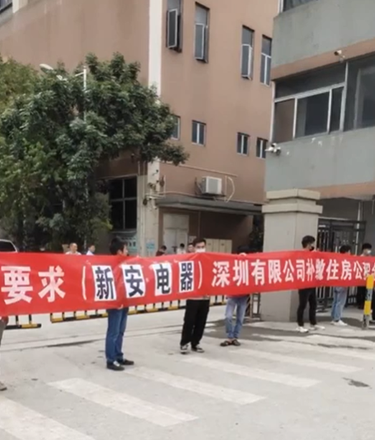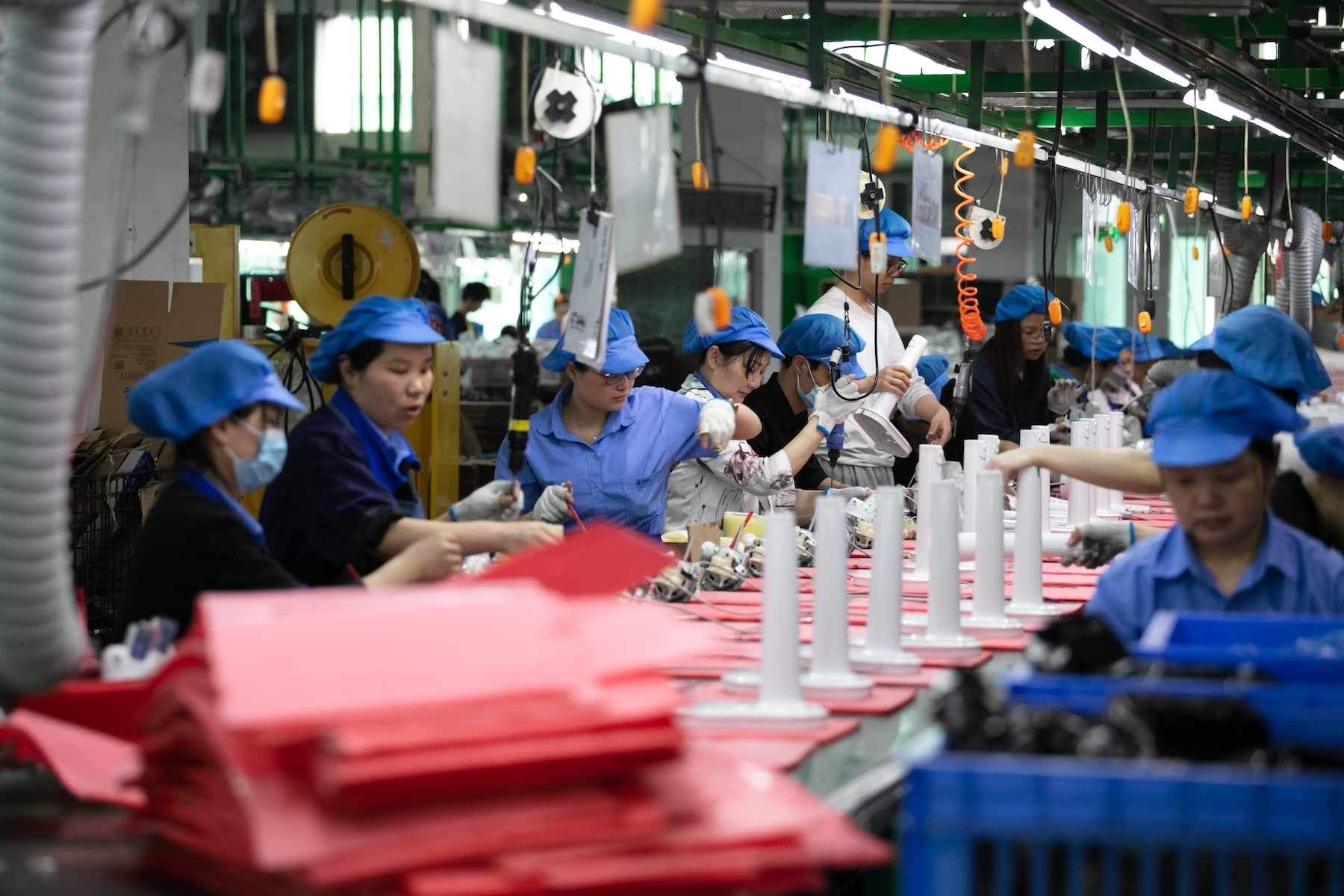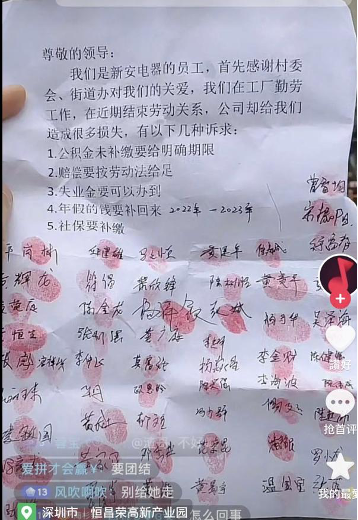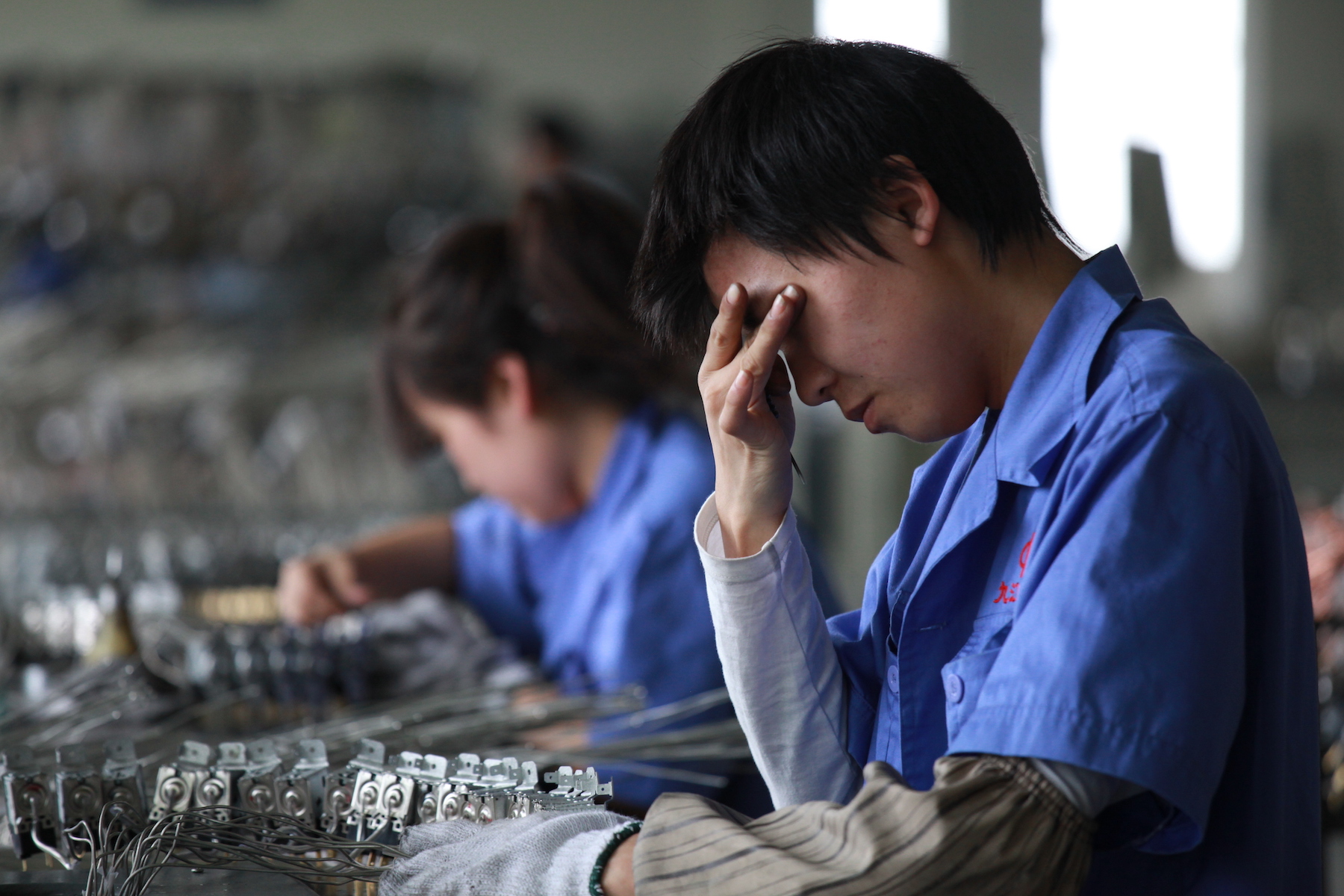Editor’s Note: This article was originally published on 7 June 2023 and was updated on 18 August 2023 to reflect the factory's closure on that date. Workers went on strike over unpaid benefits in May, and those were reportedly paid as of the factory’s August closure. Correction: Workers have not claimed that wages were owed.
- Following the 8 May strike, CLB confirmed that workers’ social security and housing provident fund benefits had not been paid; these benefits were reported as paid in late May;
- The factory officially announced it would cease operations as of 18 August 2023. Workers’ severance and other compensation are still pending;
- Sundairy Xin’an Electrics has an enterprise union, but it did not take action to represent workers’ interests or seek assistance from local union structures since the announced factory closure;
- The Hong Kong-owned parent company, Simatelex, is a member of the Responsible Business Alliance, which is governed by a code of conduct that stipulates compliance with domestic laws and guarantees fundamental labour rights.
On 8 May, workers at an electronics factory in Shenzhen went on strike for unpaid social insurance and housing provident fund benefits. About a hundred workers blocked the gate of the Sundairy Xin’an (新安) Electrics Company by holding two large banners reading:
We rationally and legally appeal to Xin’an Electrics in Shenzhen to pay up our housing provident fund

Workers posted videos online showing their banners. Source: Douyin
Upon the Xin’an Electrics factory’s 15 August 2023 notice of closure, effective 18 August, citizens online praised the company for its handling of the shutdown. They remarked that the company’s notice followed China’s law and regulations, and Xin’an Electrics was a stable source of employment for 38 years.
The social insurance benefits were paid for only the last two years, according to a statute of limitations set in the region. And housing provident fund payments were reportedly made to workers in full.
A worker laid off from Xin’an Electrics in June 2023 reported that his severance package was paid at 80 percent of the legal minimum. But this outcome is much better than workers at other factories have faced recently, in which those in similar situations have complained that they were pushed to voluntarily resign and seek other work - without severance - after not being able to make a living at factories in low production, and those who remained until factory closure were offered measly severance packages.
Employers in China are required to pay into various social insurance accounts, and the housing provident fund is a private account designed to assist with purchasing property. On 11 May, CLB called the local housing provident fund management centre and two local unions. We confirmed the workers’ claims that social security and housing provident funds were unpaid at the time of the call. We also learned in our investigation that Xin’an Electrics has an enterprise union, but it did not report the strike or seek assistance from higher-level unions.
Xin’an Electrics is owned by Simatelex, a Hong Kong company that manufactures household appliances for a range of international brands such as Keurig, Cuisinart and Philips. Simatelex is a member of the Responsible Business Alliance (RBA), an industry coalition to support better supply chain practices. Under the RBA code of conduct, Simatelex has a duty to ensure workers are paid benefits on time:
Fundamental to adopting the Code is the understanding that a business, in all of its activities, must operate in full compliance with the laws, rules, and regulations of the countries in which it operates.
China’s manufacturing sector is facing tough economic conditions, and workers need representation and defence of their labour rights as factories relocate, suspend operations or shut down completely. In addition, international brands and suppliers have a duty to China’s workers who have long produced their goods. CLB urges for a multi-stakeholder approach to labour rights challenges during supply chain changes.
From a top export manufacturer to a company struggling to pay workers
Simatelex was founded in 1969 in Hong Kong and produces small household appliances, from coffee makers and food processors to air purifiers and hair straighteners. According to its website, it was among the first few Hong Kong companies to respond to China’s Open Door Policy by shifting its entire manufacturing process to mainland China in the 1980s.
Simatelex established its first factory in Shenzhen in 1985 and has expanded since then. Today it has at least four factories in Guangdong province employing over 20,000 workers, making it one of the largest electrical appliance manufacturers in southern China. In 2019, Simatelex established a factory in Indonesia.

Photograph: humphery / Shutterstock.com
Xin’an Electrics factory produces home appliances such as coffee pots, can openers, beer machines, mixers, massagers and air purifiers. A recruitment ad claims it is a “top 100 export manufacturer” that is “an advanced labour management enterprise” by the Shenzhen government. Xin’an Electrics employed about 2,400 workers as of 2019, down from over 3,000 in 2017.
More recently, the factory has faced existential challenges. According to a 2020 report from China’s customs department, Xin’an Electrics was already facing a drop in foreign orders since the start of the pandemic, and the factory has tried to adapt by shifting to the domestic market. The factory has laid off more workers since 2020, and CLB estimates that less than 2,000 workers are employed as of 2023.
Workers are affected by changing global purchasing patterns and China’s domestic market
Xin’an Electrics’ efforts to survive since the economic changes have not been successful, as evidenced by the closure announcement and layoffs and declining wages over time. This year, a Xin’an Electrics recruiter's video said that temporary workers' pay was lower than usual. This is in line with recent information that factories in Guangdong are offering temporary workers lower than the minimum hourly wage.
In addition, a recruited worker refused the job, reporting that factory living conditions were dismal:
Workers are required to work for a whole day with just one meal. After lunch, we work continuously until 7 pm with no dinner provided. Workers are housed 16 people in a room, with common toilets and showers.
After Xin’an Electrics announced its closure and workers went on strike, workers posted their letter to the authorities requesting a range of benefits.

Dozens of workers signed a joint letter to government officials detailing their unpaid benefits. Source: Douyin
In response to the strike, Bao’an district government officials arrived at the scene, according to a 10 May video posted online and preserved in CLB’s maps. Government officials acknowledged that the factory’s failure to pay benefits contravenes the labour laws, but officials were unable to promise to hold the company accountable. Rather, they said they would provide pro bono legal assistance for workers to take their claims to labour arbitration.
When workers asked if the government could help negotiate with Xin’an Electrics to get workers paid, the official replied:
You must have confidence in the law, which is a baseline in China. We will provide free lawyers for you to sue. It is quite simple: we will send lawyers and you just need to authorise them, and then we can walk through the legal process, and let the court decide.
This reliance on legal procedures should be a backstop against violations rather than the default method of problem solving. In CLB’s experience, China’s official trade union takes a similar approach to defending workers’ rights, and we have long urged more proactive solutions to protect workers’ rights before violations occur.
The role of enterprise and local unions in Xin’an Electrics workers’ labour disputes
Xin’an Electrics has an enterprise trade union, but according to CLB’s investigation, it has not taken steps to represent workers’ interests. We learned about its activities through our interviews with the Bao’an district housing provident fund centre and the Xixiang street-level union.
The Xixiang union told us that the enterprise union has not interacted with the street-level union, nor did it participate in any of the recent Xixiang union activities. We also learned that the enterprise union has not performed its function of requesting assistance from higher-level unions over the past three years when workers faced more acute difficulties.
But the problems at Xin’an run deep enough that the enterprise union should have been aware. When CLB contacted the Bao’an district housing provident fund centre, Ms. Huang at the centre told us frankly that they have received numerous appeals from Xin’an Electrics workers. The official checked her records while we were on the phone:
CLB: You have the complaint records? About how long ago did this start? Like three months, two months, two weeks ago?
Ms. Huang: All along, we’ve constantly had complaints from them, and recently it has escalated, maybe, recently there are a lot more.
Even worse, the centre official told us that the enterprise union may have signed off on an internal resolution to approve the company’s reduction in the contribution percentage of the housing provident fund. This means that the enterprise union used its authority to show legal consent from workers to reduce the contribution fee, acting against workers’ interest while claiming to represent them.
Ms. Huang: The contribution was dropped down to three percent.
CLB: Doesn’t that violate the legal minimum of five percent?
Ms. Huang: In special circumstances, they can apply for a reduction.
CLB: Then to do that, wouldn’t the company have to negotiate the agreement with the enterprise union, or go through some formalities when the application was submitted? Does this mean that the enterprise union agreed to the reduction?
Ms. Huang: Normally, yes, but there was a period during the pandemic where companies could apply.
CLB: The pandemic is one thing, but the pandemic is already over.
Ms. Huang: In the period before that, I think the unit has applied for a reduction. Let me check… I’m looking at the materials here, there are the resolutions of the trade union meeting and so on.
Although national policies permitted a deferral of housing provident fund payments due to pandemic conditions, these expired at the end of 2022 and did not provide for a decrease in contributions.

Photograph: humphery / Shutterstock.com
As for the local unions, CLB spoke with an official at the Xixiang street-level union, who told us that their official had been at the scene of the strike. The Xixiang union’s intervention was initiated by an order from the Bao’an district union to “mediate and negotiate.” However, the union did not take up its role to represent workers in the negotiation and instead viewed itself as an intermediary among government organizations.
The Xixiang union official told CLB:
We do not have administrative power, but we will try our best to fight for workers’ benefits. We will guide the workers with complaints to go to relevant organizations, like the street-level labour bureau and to labour arbitration, and so on. But we can only do this if the workers find us and inform us about their complaints. Then we will get to know and understand what is the situation in the company. We can only try our best, but, notably, as things develop, it may not be realistic to count on the union to solve the problem in the end.
This line of reasoning is a common one that CLB hears from unions across China: that the union waits for workers to come to it, that the union will send workers through administrative and judicial procedures, and that the union cannot offer that much assistance after all.
Stakeholders should join to bring brands into negotiations
On 11 May, one worker reported online that Xin’an Electrics had placed 10 million yuan into the company’s housing provident fund account, but workers commented they had yet to receive the back payments into their private accounts. On 27 May, the same worker reported that two years’ of social security were paid, which is the time limit in Shenzhen for claiming social security arrears. CLB cannot verify whether these payments were in fact made or whether other worker demands were fulfilled.
Workers should not bear the costs of economic changes themselves, nor should manufacturers like Xin’an Electrics take a heavy hit. We can see how the company tried to pivot when international orders were cut during the pandemic, but the company has little control over broader market conditions. CLB sent an email to Simatelex to suggest paths forward:
CLB believes that your company, like all businesses, has encountered great difficulties during the three-year period of the pandemic. However, your company should not pass the loss on to the workers and their families who serve your company. Instead, your company should negotiate with the customers of the factory, the international brands, and ask the international brands to share the economic losses.
In fact, it is an industry-wide phenomenon that is the result of international brands racing to the bottom and changing purchasing patterns to maximise their profits and seek lower labour costs. One solution is for those along the supply chain to work together toward fairer conditions, and to involve other stakeholders like governments and trade unions in the process. We also wrote to the company:
We recommended that the Xixiang Street Federation of Trade Unions should directly negotiate with your company to abide by China’s laws and make full social insurance contributions, including housing provident fund payments, for all workers. If your company is willing to negotiate and resolve disputes with the Shenzhen Federation of Trade Unions, the Bao’an District Federation of Trade Unions or the Xixiang Street Federation of Trade Unions, we can provide the contact information of these trade unions.
CLB has not heard a reply from Simatelex.
The various international brands sourcing from Simatelex - including Keurig, Cuisinart and Philips - have each made guarantees about compliance with domestic labour laws and suppliers’ sustainability. But they may not be aware of the situation at the Xin'an factory.
Simatelex also received certificates from TÜV SÜD, a German technical testing company, which refers on its website to the recent German Act on Corporate Due Diligence Obligations in Supply Chains, proclaiming: “It's not just about reducing corporate risks, it's about taking responsibility for people in the supply chain.”
CLB suggested to the Xixiang street-level trade union that it could represent Xin’an Electrics workers, and we also suggested that Simatelex negotiate with brands in the supply chain on sharing the cost during difficult economic times. If the supply chain has a more balanced relationship, then brands would not just take the largest interest and leave workers and suppliers in difficulty. Instead, they should make good on their CSR promises and be responsible for the human consequences of dropping orders and moving production.
Further CLB reading:
